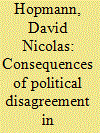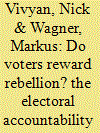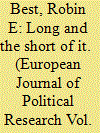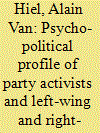| Srl | Item |
| 1 |
ID:
111507


|
|
|
|
|
| Publication |
2012.
|
| Summary/Abstract |
Political disagreement in interpersonal communication increases attitudinal ambivalence and can depress voter turnout. These effects seem to be driven by a wish to avoid social controversy rather than informational gains from encountering other opinions. This article shows that political disagreement in interpersonal communication increases the difficulty of deciding for which party to vote. Moreover, this effect is a result of social disapproval of one's party preference, while political expertise in interpersonal communication has no effect. For voter turnout, no direct effect of social disapproval of one's party preference is found. However, disapproval has an indirect influence on turnout via difficulty of vote choice. In sum, both political attitudes and political behaviour are affected by social pressures. Students of political attitudes and behaviour should try to include interpersonal discussion in their models in greater detail than is common practice today.
|
|
|
|
|
|
|
|
|
|
|
|
|
|
|
|
| 2 |
ID:
111506


|
|
|
|
|
| Publication |
2012.
|
| Summary/Abstract |
To hold their Members of Parliament individually accountable for their legislative behaviour, British voters would need to base their decision to vote for an MP at least partially on the extent to which the MP's legislative voting behaviour deviated from that of the MP's party leadership. Voters should evaluate this deviation contingent on their views of the party leadership. MP rebellion can signal that voter-MP congruence is greater than that of the voter and the MP's party leadership. In this article it is found that only constituents with negative attitudes toward the Labour government reward rebellious Labour MPs, albeit to a limited extent. A similar conditional association is not observed on a single issue: Iraq. The policy accountability of MPs is relatively weak and general rather than issue-specific.
|
|
|
|
|
|
|
|
|
|
|
|
|
|
|
|
| 3 |
ID:
111503


|
|
|
|
|
| Publication |
2012.
|
| Summary/Abstract |
While institutional theories of party system size are usually examined cross-nationally, there is ample reason to expect that changes in electoral institutions will affect party system size within countries as well. Although some of this effect may occur immediately, most of the effects are likely to be realised over time and across subsequent elections. A series of error-correction models examine the short- and long-term effects of changes in electoral institutions on party system size. The results indicate that changes in electoral institutions do produce the expected effects on party system size, and that these effects occur mostly over the long term.
|
|
|
|
|
|
|
|
|
|
|
|
|
|
|
|
| 4 |
ID:
111504


|
|
|
|
|
| Publication |
2012.
|
| Summary/Abstract |
Previous studies comparing ideological groups have been restricted to tests of between-group differences in the means of relevant political psychological variables, thereby neglecting group differences in the variances, meanings and nomological networks of the tested variables. A first exploratory study used data from the European Social Survey (N = 7,314) comparing groups of political party members on the basis of their scores on a self-placement left-right scale. The second study (N = 69) constituted an in-depth test for the presence of differences between samples of political activists of moderate parties, communists, anarchists and right-wing extremists. The results revealed that there is a fair amount of heterogeneity within left-wing and right-wing extremists, indicating a substantial amount of within-group variance of social attitudes, values and prejudice. Moreover, the extremist ideologies are best approached as distinct ideologies that cannot be reduced to extreme versions of moderate ideology, and differences in the meanings and nomological networks of the various extremist ideologies were also obtained. It is erroneous to consider members of extremist groups as being 'all alike'. The findings obtained from samples of political moderates are not a particularly solid basis for theories about extremism.
|
|
|
|
|
|
|
|
|
|
|
|
|
|
|
|
| 5 |
ID:
111505


|
|
|
|
|
| Publication |
2012.
|
| Summary/Abstract |
While Euroscepticism is the most important driver of United Kingdom Independence Party (UKIP) support, other attitudinal drivers - namely dissatisfaction towards mainstream parties and xenophobia - are also important. Examining vote-switching between first- and second-order elections evidence is found of a distinction between two types of supporter: more affluent and middle-class 'strategic defectors' from the mainstream Conservative Party who support UKIP to register their Euroscepticism, and more economically marginal and politically disaffected 'core loyalists' who are attracted to UKIP by its anti-immigration rhetoric and populist anti-establishment strategy. UKIP also succeeds in attracting core support from groups such as women who have traditionally rejected extreme right parties such as the British National Party (BNP). This suggests that UKIP is well positioned to recruit a broader and more enduring base of support than the BNP.
|
|
|
|
|
|
|
|
|
|
|
|
|
|
|
|